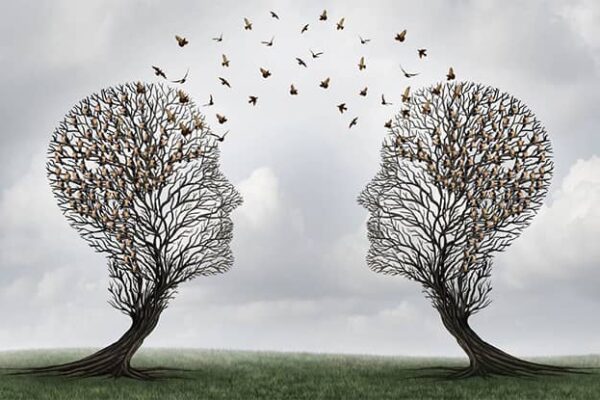Bibliotherapy is a psychotherapeutic approach that uses literature to support a person’s psychological well-being and personal growth. It is based on the idea that reading certain books can have a positive impact on emotional states, thoughts, and behavior.
In bibliotherapy, books and other written materials are used as tools to help people overcome various life challenges such as stress, anxiety, depression, personal crises and more. Bibliotherapy can be used both as an independent tool and as a complement to other forms of psychotherapy.
Bibliotherapy, as a systematic approach to healing and personal growth through reading, has a long history. Its roots can be traced back to ancient times:
- Ancient Civilizations. Already in ancient civilizations, such as Egypt and Greece, there was an understanding of the healing power of words. For example, in ancient Egyptian temples, “words of wisdom” were used to heal the soul.
- Middle Ages. In medieval European monasteries, reading religious texts was used as a means of spiritual development and comfort. Monastery libraries served not only as repositories of knowledge but also as places for spiritual healing.
- Renaissance and Enlightenment. During the Renaissance and Enlightenment, there was an increased interest in studying the human mind and soul, which also influenced the development of bibliotherapy. Reading became accessible to a broader audience, facilitating its therapeutic use.
- In the 19th and 20th centuries, bibliotherapy became formalized as a method of psychotherapy. Doctors and psychotherapists began actively using literature as part of treatment. Bibliotherapy became particularly important during and after wartime, helping people cope with psychological trauma and stress.
- Late 20th – Early 21st Century. With the development of psychology and psychotherapy, bibliotherapy became a recognized and popular direction. It is applied in various fields, including education, psychological rehabilitation of military personnel, self-development, and corporate training.
In the modern world, bibliotherapy is combined with the latest advancements in psychology and neuroscience and adapts to modern technologies, such as digital reading and audiobooks, expanding its scope and possibilities.
Today, the goal of bibliotherapy is to use literature as a means to improve psychological well-being and personal growth. In an era when many people face elevated levels of stress, anxiety, and depression, bibliotherapy offers an accessible and effective way to cope with emotional and psychological challenges. Reading fosters the development of empathy, understanding of oneself and the world, and helps form healthier ways of thinking and perception.
Bibliotherapy is relevant in today’s world because it offers an alternative and supplementary approach to traditional methods of psychotherapy. It is especially useful for those who do not have access to traditional psychological help due to financial, geographic, or sociocultural constraints. Moreover, bibliotherapy can be integrated into educational programs, thus fostering the development of critical thinking and analytical skills in both children and adults.
The importance of bibliotherapy is also due to its flexibility and adaptability. It can be applied in various contexts — from individual work to group sessions — and adapted to the needs of different age and social groups. In the conditions of modern life, when time for taking care of mental health is limited, bibliotherapy provides a unique opportunity for self-reflection and self-development in a more relaxed and less formalized way.

Foundations of Bibliotherapy
Bibliotherapy, as a unique form of psychological support and self-help where words and stories hold special significance for human existence, has been known since ancient times. In this approach, books are not merely sources of knowledge and entertainment, but also powerful tools for soul healing and emotional restoration.
Through reading, we not only immerse ourselves in other worlds and experience others’ stories but also find reflections of our own experiences, fears, and dreams, discovering new ways to understand and overcome personal difficulties. This approach allows us to slow down, delve into ourselves, and look at the problems we face in a new light.
Bibliotherapy uses literature as a mirror in which the reader can see themselves and their life from a different angle. This practice makes each page, each image, and each plot a key to better understanding oneself, one’s emotions, and relationships with the world. It offers a path to self-discovery and self-healing, based on deep interaction with literary works, overcoming internal barriers, and opening new horizons of personal development.
Theoretical Principles of Bibliotherapy
Bibliotherapy is based on several key theoretical principles that define it as an effective psychotherapeutic tool:
- Psychological Impact of Literature. Based on psychoanalytic theory, bibliotherapy recognizes that literature can have a profound effect on the reader’s subconscious. Through symbolism, metaphors, and storytelling, books help readers acknowledge and process deep emotional experiences and conflicts.
- Catharsis. Reading allows a person to experience catharsis — emotional cleansing and release from accumulated emotions and tension. This is a process where the reader empathizes with the characters, their trials and difficulties, which contributes to emotional relief and psychological ease.
- Identification and Projection. Readers may identify with characters or situations in the book, helping them better understand their own experiences and problems. This identification promotes deeper self-awareness and self-analysis.
- Insight and Self-Knowledge. Bibliotherapy fosters the development of insight — a deep understanding of personal problems and circumstances. Reading provides new perspectives and solutions, facilitating personal growth and development.
- Learning Through Modeling. Literary works often present various ways of overcoming problems and difficulties, showing positive examples of behavior and decision-making, which can serve as a learning and inspiring example for readers.
- Therapeutic Dialogue. Bibliotherapy often includes discussions about what has been read, allowing the reader to express their thoughts and feelings and receive feedback. This dialogue can take place both internally and in group sessions or with a psychologist.
- Flexibility and Individualization. In bibliotherapy, great attention is paid to the individual approach. The choice of literary works is made with regard to the unique needs and preferences of each person, contributing to a more effective therapeutic process.
These principles form the foundation of bibliotherapy, making it an effective tool for personal growth, emotional healing, and psychological well-being.
The Psychology of Reading
Reading plays a significant role in a person’s psychological development and well-being, having a multifaceted impact on both mind and emotions. This process is not simply the transfer of information but a complex interaction that influences various aspects of psychology.
- Emotional Response and Empathy. Reading allows a person to experience a wide range of emotions, from joy and delight to sadness and compassion. This fosters the development of empathy, as the reader immerses themselves in the roles of characters and their experiences, learning to understand and sympathize with others’ emotions and experiences.
- Stimulation of Cognitive Processes. Reading activates a multitude of cognitive functions, including memory, attention, analytical and critical thinking. This stimulates mental activity and promotes the development of intellectual abilities.
- Development of Imagination and Creativity. Reading expands the boundaries of imagination, as the reader must visualize the events, places, and characters described. This stimulates visualization and strengthens creative abilities.
- Reflection and Self-Knowledge. Through reading, people can find answers to questions about themselves and their place in the world. Literature often touches on deep philosophical and moral questions, prompting reflection and self-analysis.
- Calming and Stress Resistance. Reading can be a way to reduce stress and achieve psychological balance. Immersion in a story helps distract from everyday problems and concerns, allowing for rest and relaxation.
- Personal Growth and Learning. Reading provides opportunities for learning and personal development. Through books, people learn about new ideas, cultures, historical events, famous personalities, scientific discoveries, and various life philosophies.
Thus, the psychological aspect of reading encompasses a wide range of effects — from improving cognitive functions to emotional support.
The Role of Bibliotherapy in Personal Growth and Self-Knowledge
Bibliotherapy plays a significant role in the processes of personal growth and self-knowledge, offering unique approaches to development and enhancing self-awareness. Through interaction with literature, individuals encounter new perspectives and life lessons that contribute to deep inner changes and personal development.
In the process of bibliotherapy, when readers immerse themselves in the stories, experiences, and conflicts of characters, they often discover something new about themselves. This could be understanding their own emotions, recognizing hidden desires, or working through internal conflicts. Books act as a mirror, reflecting not only the external world but also the reader’s inner self.
Bibliotherapy also fosters the development of empathy and emotional intelligence. Reading about different cultures, characters, and situations broadens the scope of understanding and tolerance, helping individuals better comprehend and accept others. This is an important aspect of personal growth, as the development of social skills and empathy is essential for building healthy relationships.
In addition, bibliotherapy stimulates critical thinking and independent opinion formation. Reading prompts individuals to ask questions, analyze information, and draw conclusions, which is a key component of self-knowledge and self-development. Through analyzing literary works, a person learns to comprehend their own life, experiences, and beliefs.

Methods and Techniques of Bibliotherapy
Bibliotherapy includes a range of methods and techniques that utilize literature to achieve psychotherapeutic goals. Here are some of the most common approaches:
- Directed reading. This approach involves the psychologist recommending specific books or texts tailored to the client’s specific needs or problems. The texts may be chosen to stimulate reflection, provide comfort, offer solutions, or inspire change.
- Independent reading followed by discussion. Clients read selected books on their own and then discuss their thoughts and feelings with a psychologist or in a group. This fosters deeper understanding of the material and the integration of ideas into personal experience.
- Creative writing. In addition to reading, clients may be encouraged to write responses, reflections, or even short stories of their own. This helps to express and process emotions and thoughts that arise during the reading process.
- Symbolic analysis. Analyzing symbols and metaphors in literature allows clients to better understand their own life situations and emotions. This develops self-analysis and self-reflection skills.
- Role-playing and psychodrama. Sometimes readers recreate scenes from books or take on the roles of characters. This helps to gain deeper insight into their motives and feelings while also reflecting their own experiences.
- Group discussions and book clubs. Discussing books in a group setting allows for the consideration of different perspectives and the exchange of ideas. This also develops social skills and empathy.
- Integration with other therapeutic methods. Bibliotherapy is often combined with other forms of therapy, such as cognitive behavioral therapy, Gestalt therapy, or art therapy, enriching and complementing the primary therapeutic process.
- Reflective reading. This method involves the reader thinking about the material, relating it to their personal experiences, and reflecting on their reactions and feelings.
These methods and techniques make bibliotherapy a flexible and versatile tool that can be adapted to the individual needs and goals of different people.
Examples of Effective Bibliotherapy Use
Bibliotherapy is successfully applied in many areas, demonstrating its effectiveness in various contexts. For example, in the field of mental health, it is used to treat moderate depression and anxiety, where patients are offered books that can improve their mood and provide new ways to overcome emotional difficulties.
In educational settings, bibliotherapy helps students develop empathy, improve communication skills, and cope with school stress through reading and discussing literature.
In the corporate world, this method is used to develop leadership qualities and strengthen teamwork, where employees are encouraged to read and discuss books on leadership and team dynamics.
In the realm of rehabilitation and recovery, bibliotherapy serves as support for individuals going through difficult life periods, such as illness or the loss of loved ones. Through reading, they find comfort, strength, and understanding.
Bibliotherapy is also widely used in work with the elderly, helping them cope with loneliness, nostalgia, and cognitive changes. Reading and discussing books gives them a sense of belonging and mental stimulation.
These examples demonstrate the profound and multifaceted potential of bibliotherapy as a means of improving quality of life and psychological well-being in various areas.
Case Studies: Success Stories
In the practice of bibliotherapy, there are numerous success stories showing its positive impact on various individuals. One such story involves a teenager who suffered from social phobia, anxiety, and isolation. Through bibliotherapy, he encountered books where the main characters overcame similar difficulties. This not only helped him feel less alone in his experiences but also taught him how to manage his condition. As a result, the teenager improved his communication skills and gradually became more open and confident in social situations.
In another case, a middle-aged woman, going through a divorce and feeling deep loss and emptiness, found comfort in novels about love and recovery after hardship. Reading helped her reframe her personal experience, see new perspectives, and realize the opportunities for a new chapter in her life. She not only learned to accept the past but also found hope for the future.
There is also an example of success in a corporate context, where a team of employees faced low morale and conflicts. Through a series of bibliotherapy sessions, which included reading and discussing books on leadership, teamwork, and conflict resolution, the group was able to improve mutual understanding and cooperation. This increased productivity and enhanced the overall atmosphere in the team.
These case studies illustrate how bibliotherapy can be used to support people in different life situations, helping them cope with emotional problems and improve interpersonal relationships.

Bibliotherapy: Scientific Research and Results
Scientific research in the field of bibliotherapy has revealed many positive aspects of this method in various contexts. Studies have shown that bibliotherapy effectively reduces stress, anxiety, and symptoms of depression in different groups of people, including students, the elderly, and patients with chronic diseases. It has also proven its effectiveness in improving well-being and emotional health.
One of the key areas of research in bibliotherapy is its impact on improving mental health. Scientists have studied how reading fiction and non-fiction affects the psychological state of people suffering from various psychological disorders. The results showed that bibliotherapy contributes to the reduction of symptoms and the improvement of overall well-being.
In education, research has focused on examining the impact of bibliotherapy on developing emotional intelligence, enhancing learning motivation, and increasing empathy among schoolchildren and students. The results indicate that regular reading and discussing books contribute to the development of critical thinking and social skills.
Studies also highlight the potential of bibliotherapy in improving the quality of life for people suffering from chronic diseases, offering them a way to cope with pain and discomfort. In these studies, participants were offered books that could help them process their experience and gain psychological resilience.
Thus, scientific research confirms the effectiveness of bibliotherapy as a therapeutic tool in various areas, including mental health, education, and overall well-being.
Results and Effectiveness of Bibliotherapy
Bibliotherapy demonstrates significant positive results in various contexts, supported by numerous studies. The effectiveness of bibliotherapy is particularly evident in the following areas:
- Improving mental health. Studies have shown that bibliotherapy effectively helps reduce symptoms of anxiety, depression, and stress. Reading provides a means for emotional expression, catharsis, and self-reflection, contributing to an improved mental state.
- Developing social skills and empathy. By reading and discussing books, people learn to understand and empathize with others, which improves their interpersonal relationships and communication skills. This is especially important in educational and corporate settings.
- Increasing self-awareness and self-knowledge. Bibliotherapy promotes deep self-analysis and understanding of personal values, beliefs, and experiences. Readers often find reflections of their problems in literature, helping them better understand themselves and their reactions to various life situations.
- Overcoming life challenges. People experiencing difficult life periods, such as illness, loss, or transitional stages, find support and comfort in bibliotherapy. Reading opens up perspectives and strategies for confronting life’s challenges.
- Improving cognitive functions. Regular reading stimulates the brain, improving memory, attention, and analytical skills. This is especially important for the elderly and those facing cognitive impairments.
- Enhancing learning motivation and academic performance. In the educational sphere, bibliotherapy is used to increase interest in learning, develop critical thinking skills, and improve students’ academic performance.
These results underscore the effectiveness of bibliotherapy as a multifunctional tool capable of positively influencing the emotional, psychological, and cognitive state of people in various life circumstances.
Comparison of Bibliotherapy with Other Psychotherapy Methods
Bibliotherapy, as a psychotherapeutic method, has unique features that distinguish it from other traditional psychotherapeutic approaches. Comparing bibliotherapy with other methods highlights several important points:
- Approach to treatment. Traditional psychotherapy methods, such as cognitive-behavioral therapy (CBT), focus on changing the client’s negative thoughts and behaviors. In contrast, bibliotherapy is aimed at emotional healing and personal growth through reading and reflection on literature.
- Active client participation. In traditional forms of therapy, such as psychoanalysis, much of the work is carried out in dialogue with the therapist. In bibliotherapy, while there may be an element of dialogue, much of the work is done by the client through reading and independent reflection.
- Accessibility and convenience. Bibliotherapy is more accessible, as it does not require the constant participation of a psychologist. Books can be read at a convenient time, making this method flexible and less costly.
- Individualization of approach. Bibliotherapy allows for more personalized selection of reading material tailored to the client’s individual needs and interests, unlike more standardized methods such as CBT.
- Resource orientation. Unlike some forms of therapy that focus on problems and overcoming them, bibliotherapy is oriented toward the client’s resources and potential, their inner strengths, and opportunities for growth.
- Emotional engagement. Bibliotherapy is unique in allowing deep emotional engagement in the process, offering the opportunity to experience and process feelings through identification with characters and situations in books.
- Combination with other methods. Bibliotherapy is often used in combination with different psychotherapy methods, enriching and complementing them, whereas many other methods are used independently.

Selection of Literature for Bibliotherapy
The selection of literature for bibliotherapy is a key aspect of this method, as the effectiveness of therapy depends on the correct choice of books. Here are some criteria and approaches for selecting literature:
- Relevance to the client’s needs. It is important to consider the individual’s needs, interests, and life experiences. For example, books about overcoming difficulties may be helpful for people going through hard times, while literature on personal growth would suit those seeking ways to develop themselves.
- Age appropriateness. Especially when working with children and adolescents, it is crucial to choose books that match their age and level of understanding.
- Thematic diversity. Literature for bibliotherapy can include fiction, autobiographies, popular science books, and poetry. A variety of genres and topics helps to find the most suitable material for each individual.
- Emotional and psychological content. It is important to consider the emotional impact of the book. Some texts may be too heavy or triggering for certain readers, while others can provide support and comfort.
- Cultural and social relevance. Books that reflect the cultural and social experiences of the reader can be especially resonant and helpful.
- Language and text complexity. The complexity of the language and writing style should match the client’s level of perception and reading.
- Expert recommendations. It can sometimes be helpful to rely on the recommendations of psychologists, librarians, and other specialists who can suggest appropriate books based on their professional experience.
- Feedback. After reading, it is essential to discuss the client’s impressions and emotions to understand how effective the chosen book was and to adjust future book selections.
Thus, selecting literature for bibliotherapy requires a thoughtful and deliberate approach that takes into account multiple factors to ensure maximum benefit and effectiveness of the therapeutic process.
Adapting Reading to Individual Needs
Adapting reading in the context of bibliotherapy to an individual’s needs is an essential process that requires a deep understanding of their personal circumstances, interests, and emotional state. Books are chosen for each person that best suit their current needs and contribute to achieving therapeutic goals.
For instance, for someone going through grief or loss, works that describe similar experiences and the process of coming to terms with difficult life circumstances can be recommended. This helps them better understand and process their own feelings.
For those facing anxiety or stress, books promoting calm, meditation, or relaxation techniques are recommended. Reading such books helps develop strategies for coping with stress and anxiety.
When working with children or adolescents, literature selection is adapted based on their age, developmental level, and interests. Children are offered fairy tales and stories that foster empathy and social skills, while adolescents are recommended books that address self-identity and personal growth.
For individuals interested in personal development, books that encourage reflection on life values, goals, and self-actualization are suggested. Reading such books can become a starting point for deep self-reflection and planning changes in life.
Adapting reading in bibliotherapy to individual needs requires a comprehensive approach that involves understanding the person’s unique life circumstances, psychological state, and personal literary preferences.
Genre and Author Recommendations
Genre and author recommendations in bibliotherapy can vary greatly depending on the individual’s needs and interests. Here are some examples and recommendations:
- For reducing stress and fostering calmness
- Genres: meditative literature, relaxing poetry, adventure novels.
- Authors: Thich Nhat Hanh, Eckhart Tolle, Jon Kabat-Zinn.
- For personal growth and self-awareness
- Genres: autobiographies, psychological novels, motivational literature.
- Authors: Viktor Frankl, Brené Brown, Yuval Noah Harari.
- For overcoming grief and loss
- Genres: literature on grief and loss, themed poetry.
- Authors: Elisabeth Kübler-Ross, Joan Didion, C.S. Lewis.
- For support with depression and anxiety
- Genres: inspiring stories of overcoming, positive psychology.
- Authors: Matt Haig, Andrew Solomon, Gretchen Rubin.
- For developing empathy and social skills
- Genres: social novels, literature about interpersonal relationships.
- Authors: Haruki Murakami, Jodi Picoult, Kazuo Ishiguro.
- For children and adolescents
- Genres: children’s fairy tales, young adult novels, educational literature.
- Authors: Roald Dahl, J.K. Rowling, Louis Sachar.
These recommendations are general and can vary depending on the specific situation and the individual’s needs. It is important that the selection of literature for bibliotherapy is aligned with a psychologist or specialist who considers the client’s individual experiences and emotional state.

Bibliotherapy and Modern Trends
In a world where technology and cultural paradigms are constantly evolving, bibliotherapy is also undergoing transformations and adaptations. Modern trends in this field reflect a continuous drive toward innovation and updated approaches, allowing bibliotherapy to remain relevant in a rapidly changing world. Changes in social and technological spheres introduce new aspects to the conventional understanding and application of bibliotherapy, expanding its boundaries and opportunities.
One of the key factors influencing bibliotherapy is digitalization. In the age of digital technology, access to literature has become broader and more diverse. E-books, audiobooks, online platforms for reading and discussing literature—these all change the ways in which people interact with texts and the reading process.
Modern cultural and social trends also have a noticeable impact. Issues of mental health are becoming more open and widely discussed, which contributes to the spread of bibliotherapy as a method of self-help and psychological support. The recognition of the importance of mental well-being in contemporary society gives bibliotherapy new significance and highlights its potential and possibilities.
In this context, bibliotherapy not only follows modern trends but also actively participates in shaping new approaches to psychological health and well-being, offering people new ways to understand themselves and the world through literature.
The Influence of Digital Technologies on Bibliotherapy
Digital technologies have a significant impact on bibliotherapy, expanding its possibilities and altering traditional approaches. This influence manifests in the following ways:
- Accessibility of materials. With the advent of e-books and audiobooks, access to literature has become easier and more convenient. Readers can now access a wide range of books without needing to visit libraries or bookstores physically.
- Diversity of formats. Digital technologies offer various reading formats, including e-books, audiobooks, and online platforms. This is especially beneficial for people with visual impairments or other physical limitations that make traditional reading difficult.
- Interactivity and participation. Digital platforms for reading and discussing books allow users to actively participate in discussions, share reviews, and receive recommendations, fostering a deeper interaction with both the text and the reading community.
- Individual settings. Digital devices enable customization of the text to suit individual preferences—changing font size, style, and background, making reading more comfortable and accessible to a wider audience.
- Use of apps and online platforms. Specialized apps and platforms offer bibliotherapeutic programs, including selecting literature based on psychological criteria and conducting therapeutic sessions in a digital format.
- Expanded access. Digital technologies make bibliotherapy accessible to a broader audience, including people in remote or underserved regions where access to traditional libraries may be limited.
Digital technologies not only facilitate access to bibliotherapy but also enrich it by providing new opportunities for individualization and social interaction. This contributes to the spread and recognition of bibliotherapy as an effective tool for psychological support and self-help.
Bibliotherapy in Online Formats
Bibliotherapy in online formats has become particularly relevant in today’s world, where digital technologies play a significant role in education and personal development. Its application online represents an innovative approach to psychotherapy and self-help, including the following aspects:
- Online bibliotherapy sessions. Psychotherapists conduct individual or group sessions through video conferencing, where books and texts are discussed, their impact on participants is explored, and related emotional and psychological issues are addressed.
- Virtual book clubs. Creating online communities where participants can share their impressions of books, discuss ideas and experiences related to the literature, helps foster mutual support and exchange of experiences.
- E-books and audiobooks. Access to a wide range of literature in e-book and audiobook formats makes bibliotherapy more accessible, allowing participants to choose materials that best meet their individual needs.
- Online resources and platforms. Specialized websites and apps offer both reading recommendations and guidelines for bibliotherapy, making it easier for participants to engage in this field on their own.
- Interactive elements. Online formats can include interactive activities such as keeping journals, blogging, and participating in discussion forums, promoting more active engagement and deeper reflection on what has been read.
- Flexibility and accessibility. Online bibliotherapy offers flexibility in terms of time and location, allowing participants to integrate reading and discussions into their daily schedules.
Prospects for the Development of Bibliotherapy
The prospects for the development of bibliotherapy in today’s world promise its further expansion and integration into various areas of life. Special attention is being paid to innovations and the adaptation of the method to the changing needs of society. Bibliotherapy is expected to increasingly utilize digital technologies, such as mobile apps and online platforms, to improve accessibility and individualization of the reading and discussion process.
Further research is also anticipated on the impact of bibliotherapy on various aspects of mental health, including working with anxiety, depression, post-traumatic stress disorder, and other emotional issues. New programs and methods based on the latest achievements in psychology and neuroscience may emerge.
Bibliotherapy is also likely to find broader applications in education, helping to develop critical thinking, empathy, and social skills in children and adolescents. Special courses or clubs dedicated to bibliotherapy may be integrated into educational programs.
In the corporate environment, bibliotherapy could be used to improve teamwork, develop leadership qualities, and enhance employees’ overall well-being. This would contribute to creating a healthier and more productive work environment.
Bibliotherapy may also play a significant role in social work, helping people cope with personal difficulties, social isolation, and improving the quality of life for various groups, including the elderly and people with disabilities.
Overall, the prospects for bibliotherapy’s development are focused on expanding its application and deepening its influence on personal growth and psychological well-being in diverse social and cultural contexts.

Tips for Integrating Bibliotherapy into Daily Life
Integrating bibliotherapy into daily life can become a foundation for personal growth and improved psychological well-being. It doesn’t require radical changes to your lifestyle, just incorporating some simple and accessible habits. You can start by setting aside time for reading each day, choosing moments when you can leisurely dive into a book, whether it’s in the morning, during a lunch break, or before bed. Cozy reading environments can make this process even more enjoyable and relaxing.
It’s also helpful to keep a journal where you can record your thoughts and feelings about what you’ve read, as well as reflections on how it relates to your personal experiences. This will help you think more deeply about the reading and see the connection between literature and your own life.
Discussing books with friends, family, or in book clubs can also be valuable. It not only promotes social interaction but also allows for different perspectives and the exchange of new ideas.
Choosing books should take into account your personal interests and current emotional state, but it’s also useful to step out of your comfort zone occasionally and read something new and unusual. This will open up new horizons and contribute to personal growth.
It’s important to remember that bibliotherapy is not a duty, but a pleasure and a means of self-discovery. Therefore, approach reading without stress or pressure, allowing yourself to enjoy the process while naturally integrating it into your life.
Creating a Personal Bibliotherapy Program
Creating a personal bibliotherapy program is a process that requires careful attention to your own needs, interests, and goals. Here are the key steps for creating such a program:
- Defining goals. The first step is to determine what you want to achieve through bibliotherapy. This could be improving your mental health, developing certain skills, overcoming specific life situations, or simply enhancing your overall well-being.
- Choosing literature. The selection of books should match your goals and interests. You can make a list of books you want to read, considering various genres and authors. Keep in mind that literature should be engaging and enjoyable.
- Planning time for reading. Regularity is the key to success in bibliotherapy. Find time in your schedule for daily reading, even if it’s just short sessions.
- Keeping a journal. Write down your thoughts, feelings, and insights that arise during the reading process. This helps to understand the reading more deeply and relate it to your own life.
- Reflection and self-analysis. After finishing each book, take time to reflect on how it has affected you and what you’ve gained from it. This can be done through personal reflection or discussion with others.
- Flexibility and adjustment. Be ready to adjust your program according to changing interests and needs. If a book doesn’t bring the expected effect, don’t hesitate to replace it with another.
- Sharing experiences. Share your impressions with friends or in book clubs. Discussing what you’ve read with others will open up new perspectives and deepen your understanding.
When creating your personal bibliotherapy program, remember that the main focus is the process, not the end result. Allow yourself to enjoy reading and discovering new horizons through literature.
Resources and Support for Beginners
For those just starting their journey into the world of bibliotherapy, there are many resources and sources of help that can make this process easier and more productive:
- Libraries and bookstores. Local libraries and bookstores often offer book recommendations and help with selecting literature that suits your interests and needs.
- Online resources. There are many websites and blogs dedicated to books and reading, where you can find recommendations, reviews, and discussions. Platforms like Goodreads also allow you to track the books you’ve read and receive personalized recommendations.
- Book clubs. Joining a book club can be a great way to share impressions and get support from other reading enthusiasts. Many book clubs operate in an online format, making them accessible to a wide range of people.
- Social media and forums. Communities on social media and forums provide an excellent opportunity to discuss books and share opinions with like-minded individuals.
- Reading apps and audiobooks. E-book reading apps and audiobook platforms like Amazon Kindle, Audible, and Google Play Books offer easy access to a wide selection of literature.
- Professional consultations. If you’re looking for a more structured approach to bibliotherapy, you can seek professional help from a psychologist specializing in bibliotherapy.
- Educational courses and webinars. Many educational platforms offer courses and webinars on bibliotherapy, which help deepen knowledge in this area and learn how to effectively use reading for personal growth.

Conclusion: Key Takeaways and Main Findings
Bibliotherapy represents a unique and powerful tool for personal growth and psychological healing. This method, which uses reading as a therapeutic tool, demonstrates its importance and effectiveness in various fields, from reducing stress and anxiety to developing empathy and social skills. Bibliotherapy offers a flexible and individualized approach, taking into account the unique needs and interests of each person.
In today’s society, where stress levels and psychological issues continue to rise, bibliotherapy is becoming increasingly relevant. It provides an accessible and comfortable way for self-help and personal development that can easily be integrated into daily life. With the advancement of digital technologies, bibliotherapy is becoming even more accessible and convenient, opening new horizons for expanding its possibilities.
The prospects for further exploration of bibliotherapy are vast. Research into its impact on various aspects of mental health is expected to continue, as well as the development of new methods and approaches that combine traditional practices with modern technologies. Bibliotherapy may find applications in the education system, social work, and the corporate world, offering effective solutions for improving quality of life and well-being in various social contexts.
Recommended Reading List
For those interested in bibliotherapy, looking to start applying it in their life or professional practice, or wanting to deepen their knowledge in this area and needing practical advice, I recommend the following works:
- “Re-thinking Therapeutic Reading” by Kelda Green. This book offers a new perspective on reading as a therapeutic practice.
- “Bibliotherapy” by Liz Brewster and Sarah McNicol. This book sheds light on bibliotherapy as a method and practice.
- “Healing Through Books: The Evolution and Diversification of Bibliotherapy” by Natalia Tukhareli. This work explores the development and diversity of bibliotherapy.
- “Literature and Transformation: A Narrative Study of Life-Changing Reading Experiences (Anthem Studies in Bibliotherapy and Well-Being)” by Thor Magnus Tangerås. The book examines the impact of literature on life changes.
- “Bibliotherapy: A Guide to Using Books in Clinical Practice” and “Bibliotherapy: A Clinical Approach for Helping Children” both by John T. Pardeck. These works explore bibliotherapy in clinical practice and its use in helping children.




